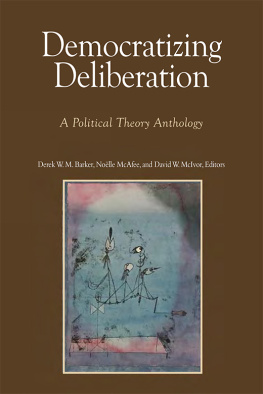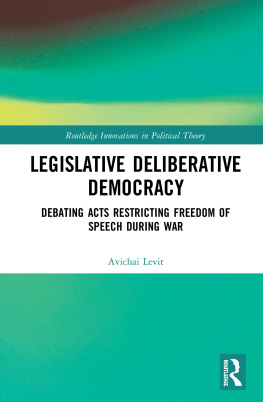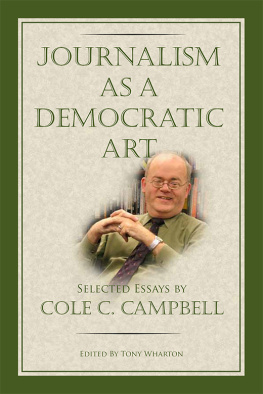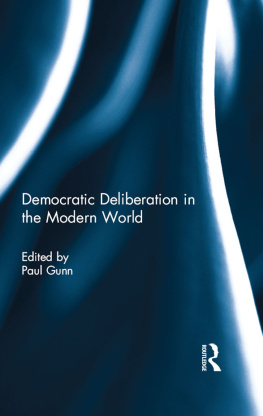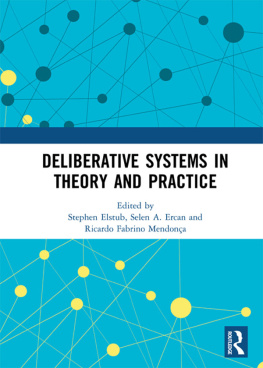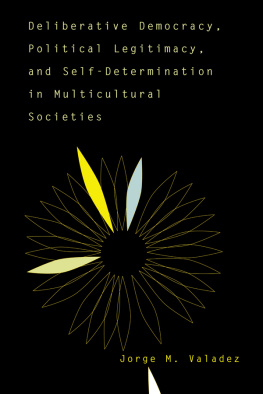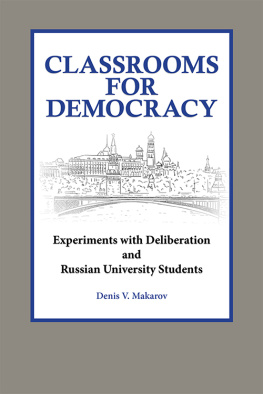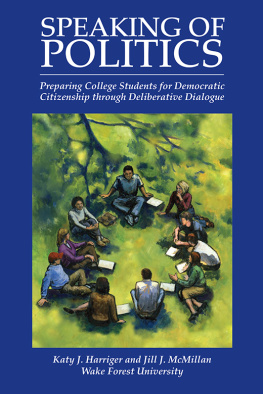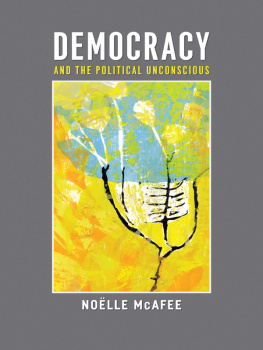Democratizing
Deliberation
A Political Theory Anthology
Derek W. M. Barker, Nolle McAfee, and David W. McIvor, Editors
Kettering Foundation Press
COVER ART: Klee, Paul (1879-1940) ARS, NY. Twittering Machine (Die Zwitscher-Maschine). 1922. Oil transfer drawing, watercolor, and ink on paper with gouache and ink borders on board, 25 1/4 x 19 (64.1 x 48.3 cm). Purchase.
The Museum of Modern Art, NY, USA.
Digital Image The Museum of Modern Art/Licensed by SCALA/Art Resource, NY
2012 by the Kettering Foundation
ALL RIGHTS RESERVED
Democratizing Deliberation: A Political Theory Anthology is published by Kettering Foundation Press. The interpretations and conclusions contained in this book represent the views of the authors. They do not necessarily reflect the views of the Charles F. Kettering Foundation, its directors, or its officers.
For information about permission to reproduce selections from this book, write to:
Permissions
Kettering Foundation Press
200 Commons Road
Dayton, Ohio 45459
This book is printed on acid-free paper.
First edition, 2012
Manufactured in the United States of America
ISBN 978-0-923993-41-2
Library of Congress Control Number: 2012931765
We are grateful to the authors for their generous contributions to this volume. Not only did they allow us to use their work, they were also collegial and efficient in working with us throughout the editorial and permissions processes. David Mathews originally suggested this project, and, as is evident in his foreword, provoked our conceptual thinking about common criticisms and misunderstandings of deliberation. Special thanks are due to the Deliberative Theory Working Group, including Harry Boyte, Mark Button, Albert Dzur, Carmen Greab, Roudy Hildreth, Ekaterina Lukianova, Michael Neblo, Melvin Rogers, and Se-Hyoung Yi; and Kettering Foundation colleagues, including John Dedrick, Alice Diebel, and Debi Witte, who participated as ad hoc members. The group met on several occasions to provide feedback on our selections for the manuscript and review our introductory essay. David Alexander granted us permission, on behalf of the late Iris Marion Young, to include her work. Finally, we thank Kettering Foundation staff Val Breidenbach and Sarah Dahm for administrative support.
Democracy has many meanings, and debating its meaning is one of the characteristics of a democracy. It should not be surprising, then, that there are also different interpretations of public deliberation and its role in democracy. At the Kettering Foundation, we have never felt that there is one true definition of either termonly that we need to be as clear as possible about what we mean when we use these words. That necessity led us to look at how political theorists have defined deliberation, because we draw on that rich body of work. In this foreword, I will describe how Kettering has come to see deliberation as a key democratic practice and an entry point into democratic politics writ large.
The story of Ketterings use of deliberation begins with a distinction that former Kettering board member Daniel Yankelovich made in his analysis of public opinion. He found a qualitative difference between the initial, ever-shifting reactions people have to politicians and policies and the more stable, reflective judgments people often make when it comes time to vote or pass a law. This distinction led Kettering to collaborate with Public Agenda, a nonprofit organization founded by Yankelovich and Cyrus Vance, in preparing briefing books for citizens on major policy issues facing the country (Social Security financing, for example). The purpose of these books was, and continues to be, to help people move from first and often hasty reactions to more thoughtful, shared judgments.
The books, now called National Issues Forums (NIF) issue books, have been used since 1981 by civic, religious, and educational institutionsand even some prisonsin all 50 states. There are variations of these books being used from the Middle East and Africa to Latin America and the Pacific Basin. Participants in deliberative forums based on these books often notice something different about these conversations. But initially, we didnt have a word to describe what was happening; we only knew that forums are neither discussions nor debates.
The search for a term to describe what was going on eventually led us to settle on deliberation or, more precisely, public deliberation. The word appealed to us because it has a history. In Latin, libera refers to a pound (libra) or the act of balancing or weighing, as on a scale (libro). These roots call to mind thoughtfully considering a matter, in consultation with others, in order to make a balanced decision.1 Carefully weighing in the process of determining the worth of something also suggests the exercise of our faculty for judgment. Personally, I like Thucydides account of Pericles funeral oration, which describes the talk (logo) used before people act in order to teach themselves (prodidacthenai, a word that lacks any English equivalent) how to act.2 In addition, we drew on Isocrates discussion of the particular kind of reasoning he advocated in the Antidosis and on Aristotles concepts of moral reasoning and phronesis, or practical wisdom.3 Yet, deliberation had the advantage of being familiar to English speakers, and Latin won out over Greek equivalents.
Our foundation has learned a great deal about public deliberation from NIF and similar forums. For instance, participants arent always content to deal with national issues and policy choices. Many people have gone on to use deliberative framings and decision making to foster collective action on the problems that they encounter in their local communities. Most everyone has recognized that something in the community is not as he or she wants it to be; yet people may not agree about what the problem is or what should be done about it. And the disagreements are normative; people differ not so much over the facts as over what the facts mean. They struggle with determining the right thing to do. When the issues are controversial, like how to prevent the spread of AIDS or whether to permit a clinic that offers abortions, this is particularly evident. The deliberation we see is as Aristotle described it, an attempt at moral reasoning.
Moral reasoning has proven particularly relevant to our colleagues in the Middle East. Modern democracyor more precisely, representative governmentdepends heavily on rational decision making. Reason and logic work fine when factual matters and tangible interests are in contention but not when values derived from identity and religious convictions are involved. One of our associates, Randa Slim, explains this when writing about the Middle East:
The prevalent form of democracy people have come to know so far has been representative democracy. What the West has most cared about is the holding of elections, people going to the voting booths. Though these acts of citizen participation are an essential first step in a society transforming itself into a democratic state, they are rarely by themselves sufficient to usher in an era of sustainable stability.
In divided societies, the challenge for any political intervention aimed at promoting sustainable democratic change is to move the individual from the confines of his or her self (often defined by the tribe or ethnic identity) to the wider realm of a citizen actor.4

